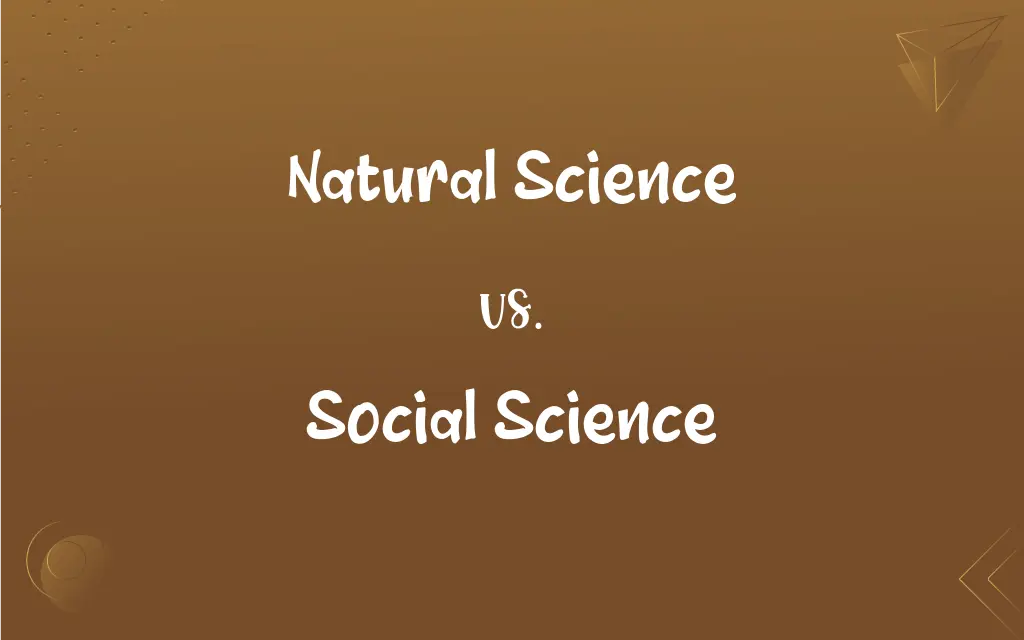Natural Science vs. Social Science: What's the Difference?
Edited by Aimie Carlson || By Harlon Moss || Updated on October 2, 2023
Natural science studies the physical and natural world through observation and experiments, while social science studies human societies and relationships.

Key Differences
Natural science employs empirical evidence and the scientific method to understand the physical universe. This domain embraces fields like physics, chemistry, and biology, focusing largely on observable and measurable phenomena. Social science, conversely, examines the social, cultural, and psychological aspects of human beings, employing various research methodologies, often qualitative, to explore human behavior and societies.
In the context of natural science, researchers often conduct experiments in controlled environments to establish causal relationships between variables. Social science, on the other hand, might utilize surveys, observations, and statistical analysis to explore correlations within societal phenomena, acknowledging the challenge of controlling for variables in human societies.
Natural science often seeks universal laws to explain natural phenomena, such as gravity or thermodynamics, aiming for findings that are applicable in varied contexts and times. In contrast, social science may acknowledge the specificity and relativity of cultural, social, and psychological phenomena, recognizing that findings might not be globally applicable due to varying cultural and social contexts.
Approaching reliability and predictability, natural science tends to generate relatively stable and predictable outcomes, attributed to its adherence to the scientific method and control over experimental variables. On the flip side, social science may present outcomes with higher degrees of variability and less predictability due to the intrinsic complexity and variability of human behavior and societies.
With a commitment to objectivity, natural science often asserts a clear demarcation between the observer and the observed, striving for unbiased observations and results. In social science, researchers might accept that complete objectivity is elusive, acknowledging that their perspectives and experiences can intrinsically influence their observations and analyses.
ADVERTISEMENT
Comparison Chart
Focus
Physical & natural world
Human societies & behaviors
Methodology
Primarily quantitative
Often qualitative
Predictability
High
Variable
Objectivity
Clear observer/observed demarcation
Acknowledges observer influence
Universality
Seeks universal laws
Recognizes cultural specificity
ADVERTISEMENT
Natural Science and Social Science Definitions
Natural Science
Natural science investigates physical, chemical, and biological phenomena.
Natural science explores the intricacies of photosynthesis in plants.
Social Science
Social science often embraces the relativity and specificity of human experiences.
Social science researchers acknowledged that cultural norms significantly influenced the study's findings.
Natural Science
It adheres to the scientific method to derive conclusions.
Through natural science, the hypothesis on light behavior was tested via controlled experiments.
Social Science
Social science investigates human behaviors, societies, and relationships.
Social science research revealed patterns in voting behaviors among demographics.
Natural Science
It often involves experiments conducted in controlled environments.
Natural science enabled the development of vaccines through rigorous testing.
Social Science
It employs various research methodologies, often including qualitative approaches.
The social science study used in-depth interviews to understand community dynamics.
Natural Science
Natural science seeks to establish universal principles and laws.
Newton's laws of motion, grounded in natural science, apply universally.
Social Science
It explores correlations and patterns within societal phenomena.
Social science highlighted a correlation between educational attainment and health outcomes.
Natural Science
Natural science aims for objective, unbiased observations and results.
The natural science study aimed to minimize subjective interference, ensuring data purity.
Social Science
Social science acknowledges the variability and complexity of human phenomena.
Due to the complexity identified by social science, socioeconomic factors were deemed crucial in policy-making.
FAQs
What is the fundamental focus of natural science?
Natural science primarily focuses on understanding the physical and natural world through observation and experimentation.
What is the primary aim of social science?
Social science aims to understand human behavior, societies, and relationships through various research methods.
Can natural science provide solutions to social issues?
While natural science might inform aspects like technological solutions, understanding and addressing social issues predominantly falls within the realm of social science.
Can natural science provide insights into human behavior?
While natural science can inform understandings of human biology and physiology, it does not directly study societal and behavioral aspects, which is the domain of social science.
How does social science approach the study of cultures?
Social science studies cultures through methods like surveys, observations, and interviews, considering societal, psychological, and historical contexts.
Are natural science findings always universally applicable?
Although natural science seeks universal laws, some findings may be influenced by specific contexts or conditions.
How does social science deal with cultural variability?
Social science recognizes and accounts for cultural variability by considering context-specific factors and utilizing diverse research methods.
How does natural science contribute to technological advancements?
Natural science, through its discoveries and formulations of physical laws, often paves the way for technological innovations and advancements.
Do natural science studies influence environmental policies?
Yes, natural science studies provide vital data regarding environmental phenomena and changes, which can inform and shape environmental policies.
How can social science findings inform policy-making?
Social science provides insights into human behavior and societal patterns, which can guide policies to address social issues effectively.
Can social science utilize quantitative research methods?
Yes, social science can and does utilize quantitative methods, such as surveys and statistical analyses, to explore and understand societal phenomena.
What disciplines fall under natural science?
Disciplines within natural science include physics, chemistry, biology, earth science, and astronomy.
Which fields of study are considered social science?
Social science encompasses fields like sociology, psychology, anthropology, economics, and political science.
How does social science contribute to societal development?
Social science contributes by providing insights into social dynamics, thereby informing policies and interventions that facilitate societal development.
How does natural science ensure objectivity in research?
Natural science emphasizes the scientific method, employing controlled experiments and peer review to minimize bias and validate findings.
How does social science approach the study of economic systems?
Social science examines economic systems by exploring factors like production, distribution, and consumption of goods and services within societal contexts.
Can natural science research inform medical advancements?
Absolutely, natural science research, particularly in biology and chemistry, plays a crucial role in developing medical knowledge and innovations.
How can social science research promote social justice?
Social science research can highlight social inequalities and provide data that supports the development of policies and programs aiming to promote social justice.
Why does natural science often employ quantitative research methods?
Natural science prioritizes quantitative methods to enable precise measurement and validation of hypotheses through statistical analysis.
How does social science inform understanding of historical contexts?
Social science explores historical contexts by analyzing past events, cultures, and societal structures, offering insights into historical patterns and developments.
About Author
Written by
Harlon MossHarlon is a seasoned quality moderator and accomplished content writer for Difference Wiki. An alumnus of the prestigious University of California, he earned his degree in Computer Science. Leveraging his academic background, Harlon brings a meticulous and informed perspective to his work, ensuring content accuracy and excellence.
Edited by
Aimie CarlsonAimie Carlson, holding a master's degree in English literature, is a fervent English language enthusiast. She lends her writing talents to Difference Wiki, a prominent website that specializes in comparisons, offering readers insightful analyses that both captivate and inform.































































